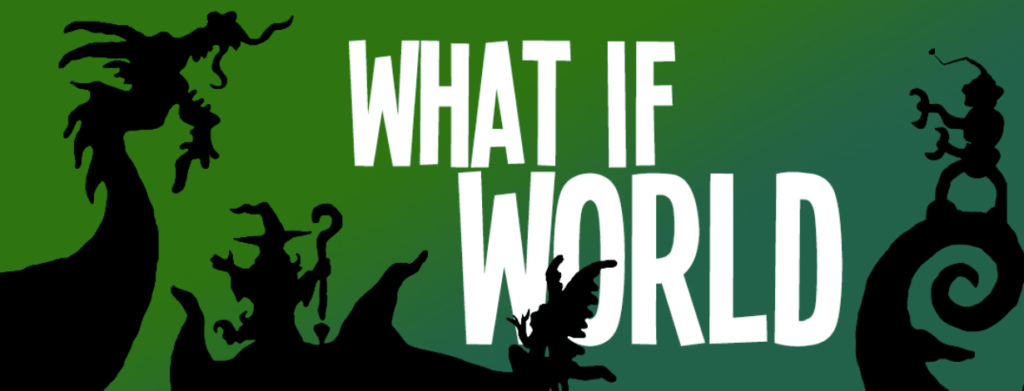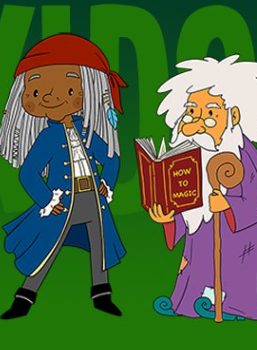
Summary
This was another typical episode structure with a twist: a guest star Jonathan Cormur of Dorktale Storytime is a co-host. They decided to combine two questions for this episode to keep it interesting: “What if there was an island that was actually a giant turtle?” suggested by Remi, “What if dragons breathed sprinkles?” as suggested by Dan, and a surprise question to be revealed later.
It opened with Abacus P. Grumbler, a head lecturer at a wizard school, summoning his class to meet Igneous Draconius, a Dragonborn guest lecturer that made a powerful and frightening introduction before goofily introducing himself as Mr. Iggy. Abacus quickly becomes jealous of Mr. Iggy’s abilities, and challenges him to a duel.
They engage in three challenges: levitation, conjuration, and transformation. While Mr. Iggy was levitating the class, summoning an island turtle, and transforming his breath into sprinkles, Abacus was flying into walls, conjuring smelly old cats, and giving the students wheels for feet! Humiliated and hurt, Abacus runs off to his secret wishing salmon, Sal, to go back in time and sabotage Mr. Iggy. Mr. Iggy did not notice that he had offended Abacus, and finds out about the wish as he went to apologize. They both admit that they were trying to impress the other and hug it out.
I felt like I was being a bad professor and a bad wizard, but now I’ve been a bad friend, I’m afraid.
ABACUS (MR. ERIC O’KEEFEE)
Now that their problem is solved, Sal considers the wish granted, and now they must pay the price: Mr. Whiskers, the old cat, is now a talking, magical teacher that all the students like best.
At the end, Mr. Eric spoke with Johnathan about his show. It is now revealed that Johnathan is on the autistic spectrum, and it was hard for him to pick up on social cues. He notes that that is what happened with Mr. Iggy did with Abacus, and hearing an explanation on how he was feeling was all he needed to correct himself. Finally, Liam’s question is revealed: “What if Abacus gave people wheels for feet and cars as arms?”
Analysis
This episode had the clearest theme out of the three I listened to. Our main characters were dealing with relatable issues that kids and adults alike can relate to and learn from. I certainly wish I was exposed to more lessons like this as a kid, as I think early practice would make vulnerability and effective communication more common in adulthood for me and others. Every scene was clear in my head down to the setting, likely because school settings are familiar to me already and I did not have to create an image from scratch.
It’s hard to be the first one to admit you’re wrong and apologize, but usually it leads to the other person going, “yeah, I’m sorry too.”
JONATHAN CORMUR
I will say, the ending interview sold this story to me more than anything else. Understanding that Mr. Iggy was demonstrating behaviors of a person (or Dragonborn) with autism added wonderful layers to his character, the resolution, and my takeaway. It is so important to teach kids and adults about how to understand and include people with autism, so these skills are critical.
Child Appeal
I want to clarify that the entire story was engaging for children. I do believe, however, that the final interview seemed entirely targeted towards adults. Not everything has to be directed towards kids, of course, but this interview was so critical to my takeaway that I wish kids could have benefitted from it too. Instead of adding goofy voices to this personal discussion, a potential alternative could have been stressing some of these lessons in the story itself. Again, it is stressed, but Abacus never said that he should have been honest from the beginning. It seemed as though Mr. Iggy was the only one at fault, which made me dislike Abacus for not taking accountability for being silent. Instead, his apology was for planning to sabotage him. Since this is Abacus’s story, I think it is important for him to acknowledge he could have equally participated in the solution instead of expecting an apology from someone who did not notice there was a problem.
I may have missed something, but I could not tell what Sal’s cost for the wish was, so I imagine kids could not get it either. Is it that Mr. Whiskers can talk? That he can do magic? That he’s the favorite professor? Or is it all three? I don’t necessarily like that making up with each other is a punishable offense; that may convince kids that vulnerability is something to avoid. I do see, however, that not having to compete for favoritism keeps them from fighting, but could it instead be that the “cost” is that they are both loved equally?
Sound Effects
On the note of clarity, many of the sound effects often painted a misconstrued image in my head. One instance where this happened was when Abacus did his levitation spell. To me, it sounded like his spell shot out of his wand and was popping the bubbles, and it was not until Mr. Iggy explained afterwards that I found that it was him flying around the room. Additionally, after Sal declared there would be a cost, there was a very brief swiping sound that apparently meant the passing of time. I was thoroughly stumped, as the ending already confused me as it is. I almost thought the cost was launching them into an alternate universe where Abacus and Mr. Iggy’s roles were reversed.
Lastly, I found the music choice during Abacus and Mr. Iggy’s confessions to be very distracting! It was a touching, vulnerable moment, and the music sounded as though cartoony shenanigans were unfolding. It extracted the emotion of the moment and weakened the overall takeaway for me, so I wish it matched the mood of the speakers a bit more.
Art and Photo Credit: What If World official website


